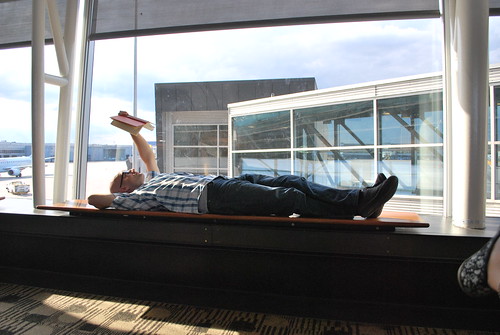When packing for a trip, before I’ve even started gathering clothing, I make a stack of books. Complex calculations follow. How many books am I likely to read in x days? By what factor does that number decrease for each
niece or
nephew on the trip? By how many books should I overestimate that number in case I rabidly dislike a book or two that I’ve brought? Is it worth bringing a recently purchased and much looked-forward-to hardcover despite it being significantly heavier and larger than paperback options?
The answer of course always turns out the same: too many. But I don’t mind. It’s better than the alternative, though my shoulders might disagree. Stacey laughs a little, I pack the books back home, and a few of them go on the stack for the next trip.
For the trip we just returned from, I carried nine books. And I read six, which doesn’t sound like a bad ratio to me—though one, John Grogan’s
Marley and Me (2005), was brought (and pressed into my hands) by my mother, so I was really only five for nine. I spent much of the week reading Peter Guralnick’s
recent biography of Sam Cooke, about which I hope to write a full post eventually.
But the other four?
Hard Case Crime. Small, lightweight, and, now that I’ve ironed out
the problems with my subscription, stacked six deep on my kitchen counter, they were the perfect traveling companions.
I started with Dominic Stansberry’s
The Confession (2004), in which a forensic psychologist tells of a series of murders that may have been committed by a serial killer—and for which the psychologist himself is under increasing suspicion. Stansberry plays throughout with the reader’s trust in the narrator, even briefly reaching Ishiguro-level heights of uncertainty, in a scene where the psychologist breaks into the district attorney’s home in search of exculpatory evidence. Did the psychologist really find what he says he found? Did he even break in at all? At other points, Stansberry’s attempts to imprison the narrative so completely in the psyche of one character works less well, but he kept me off-balance and guessing most of the way, and the truly creepy end made the book well worth the read.
Next up was Day Keene’s
Home Is the Sailor (1952), a very quick read and an excellent example of the average-Joe-in-over-his-head genre. A sailor who has forsworn the sea goes on a multi-day drunk, marries a beautiful, wealthy woman, and, to no reader’s surprise, finds himself involved in a murder. Keene writes sharply and efficiently, and he succeeds in one of the areas I view as essential to good crime writing: giving a good sense of the setting, which in this case is the San Diego area. In addition, he presents a scene in which a woman explains how her gender (with the help of bad luck) has more or less entrapped her in an unsatisfying marriage, locale, and life. Without overplaying the moment, Keene thus takes at least a small step towards balancing the gender scales in what is often tagged a misogynistic genre.
Misanthropy, rather than misogyny, animates Ken Bruen and Jason Starr’s spectacularly fun
Bust (2006), which opens with a New York businessman hiring a hit man to knock off his wife. But the hit man isn’t really a hit man, and he’s dating the businessman’s mistress, so as you can imagine, things rapidly deteriorate. Soon, half a dozen or so people are involved in the murder plot and/or cover-up, all looking out exclusively for their own interests, but all more or less incompetent. Not a single person involved is sharp enough to think more than about a move and a half in advance—which Bruen and Starr use to great advantage, plotting tightly but maintaining the impression that the book really is being driven by the poor decision-making of the dopes involved. It’s quite an achievement. Meanwhile, their misanthropy is leavened by what seems to me to be a genuine affection for their characters, grotesque and despicable as they are. How could an author not enjoy the company of a character who freaks out far more about herpes than about being executed for murder?
Bust is great (and horrible) fun. I wish I had it here to quote from, but I lent it to my dad, who reads far more mysteries than me, and who, by lending me Stephen King’s
The Dakota Kid (2005), introduced me to this series.
The last crime novel I read on the trip, Madison Smartt Bell’s
Straight Cut (1986), is a New York novel, too, set in the run-down early 80s city. The narrator, a film editor with a somewhat shady past, also travels to Rome, London, and Brussels, and each city is distinct and memorable, not just exotic window dressing. Bell writes excellent prose, striking a balance between noir spareness and world-weary reflection, and while the central relationship—a vexed male-male friendship—doesn’t come to life as completely as it should, the narrator himself is strong enough to carry the book. He knows his friend is entangling him in something dangerous, but he’s ambivalent about his life anyway (reading
Kierkegaard will do that to you) and just curious enough to let himself get sucked in.
Straight Cut is the best novel I’ve read in the series so far, atmospheric, and compelling. Bell is someone I had never read, despite the tremendous praise his books generate; liking
Straight Cut may lead to me tackling
his Haiti trilogy.
But now it’s time to pack books for another trip, this time to Portland. I’m taking
two books on Spinoza, Tom Reiss’s
The Orientalist, Phillip Caputo’s
Acts of Faith . . . and two more Hard Case Crime novels, Allan Guthrie’s
Kiss Her Goodbye and Richard Stark’s
Lemons Never Lie. Surely that'll be sufficient. And if I should I run out, well, what better re-supply depot could I ask for than
Powell's City of Books?
Between travel, work, and the holiday, I probably won’t post until after the 4th of July holiday. Don't set too many things on fire.

